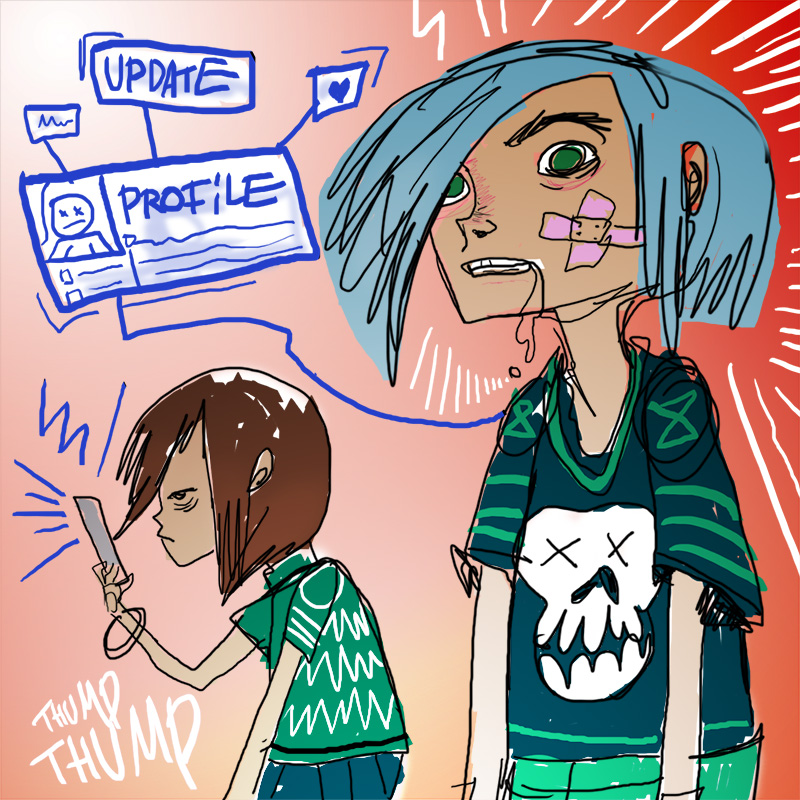
By Mars Dorian, {grow} Contributing Columnist
A viciously addictive series has taken my mind hostage and filled it with warnings about the future.
The culprit is Black Mirror, a dystopian sci-fi show from the UK, now bought by Netflix and prolonged to a third season. Each episode works like a standalone cautionary tale and deals with ordinary people abusing technology to ruin their lives.
Hence, it’s just like our social media world:)
Below, I’ve revealed my top five lessons I’ve extracted from the hauntingly real dystopian hit series, spoiler free of course:
Becoming technology’s tool
In “The Entire History of You” episode, citizens wear their ‘smartphones’ as implants behind their ears. This chip acts as both a hard drive for your memory and as a social media device where everything you see with your cybernetic contacts gets recorded. Imagine storing your entire life—your birth, your marriage, your sweetest and darkest moments, in your brain like a data file, which you can check every time you want.
In the story, the frustrated main character attends a dinner with his life partner and old friends. One of the guests turns out to be an ex-lover of his wife, which sparks social tension. After the event, the main character watches the ‘rerun’ of the dinner and becomes obsessed with the footage. He desperately wants to find out if there’s a still connection between his wife and the ex-lover and goes full memory recording detective, risking everything in the process.
Lesson 1: Don’t become the tool
The main character becomes obsessed with the social recording technology. He rewinds discussions on screen and stops sleeping as the technology pulls him in a like a tractor beam. He ruins his relationship and his life as he manically tries to find visual and audible evidence about his wife’s alleged affair.
This reminded me of a time when I became obsessed with Twitter debates a few years ago. I spent months “proving” people wrong, often up to eight hours per day, googling infos that supported my view while ditching sleep and work. It was bad for my health, bad for my wallet. I had become a Twitter tool.
Lesson 2: Your behavior stays in the forever machine
In the beginning of the episode, the young couple argues over the course of their relationship. They throw arguments at each other and curse like drunken satanic sailors. Whenever a character claimed to “never have said that,” the other person simply replayed the scene via a shared screen.
On the internet, everything you say and upload becomes part of the forever machine. Once you reach a little bit of fame, your critics will dig up your digital dirt and use it against you, so control your output with an iron glance.
That’s why I have refrained from partaking in toxic debates and political statements, which always can be used against me later on.
Influencers and followers VS. You
In the “15 Million Dollar Merit” episode, the two main characters live in a futuristic commercial complex with single room apartments, where they get bombarded by mandatory commercials. These lower class citizens earn money by conforming to society and working the treadmill.
The goal is to accumulate enough credits to earn a participation ticket to a twisted talent show, reminiscent of American Idol. There, an outspoken jury rates your performance and decides whether you get to upgrade your career in the form of exclusive deals (upper class) or whether you have to return to your treadmill (the lower class).
Ultimately, the two main characters slave their last credits to attend the show and get coerced by a crowd that isn’t deciding in their best interests.
Lesson 3: If you didn’t set the rules, you’re part of the game
In this episode, the protagonists have no control over the rules of the game. They think they can build their dream career by tricking the game, but the game masters run everything.
Every online platform has their own rules and the rules change constantly. YouTube’s new strict policy about what counts as advertiser-friendly content and Twitter’s discontinuation of their Vine app negatively impacts the livelihood of content providers who have focused on these platforms.
I rely heavily on Amazon’s self-publishing platform, but work hard on diversifying my income through illustrations and consulting work so I don’t crash when Amazon changes the rules.
Lesson 4: Beware of influencers (who don’t know you)
In the show, the characters are manipulated by so-called influencers and an army of avatars into “accepting” a drastic career move that goes against their deepest desires. This is a social media lesson where we easily follow the opinions of influencers and followers. We value their voices over our own and go against our desires, doing what’s trendy instead of what is right.
Early in my digital career, I’ve followed the paid advice of a famous blogger consultant who said I should stop drawing and focus on monetizing my blog instead … Bad advice I followed for almost half a year, until my intuition taught me better.
You get ranked
Forget about Amazon and Klout ratings, in the episode “Nosedive,” citizens rank each other in 1-5 stars. Worse, the entire society is built on these ratings, so the higher you rank (5 being the best score) the more privilege in the form of housing, jobs and financial opportunities you get.
The main character is Lacie, an ambitious socialite, brilliantly played by Bryce Dallas Howard. She wants to live in an exclusive suburban neighborhood with smart houses, rich neighbors, and harmonic scenery.
The problem?
She’s only ranking at 4.2, and the minimum citizen score of this guarded neighborhood starts at 4.5. So during the episode, Lacie desperately tries to increase her ranking to snatch the sought-after house that’s reserved for her. Needless to say, nothing goes as planned, as Lacie faces one disaster after another, which leads to drastic droppings of her social score. And with every ranking decrease, society treats her harsher, forcing her into an emotional and financial breakdown.
Lesson 5: Meaningful connections matter over utilitarian networking
Lacie is ‘super nice’ to everyone, even to those whom she hates. Her only goal is to gather positive citizen reviews, which makes her throw honesty and authenticity overboard. But during the course of the episode, more and more people see through her scheme and give her 1 star reviews because of her fake politeness. Her desire to make everyone like her becomes her downfall.
If your only goal is to network with people online because you want something from them in return, people will eventually see through your ruse.
Strangers still write me emails where they unleash general compliments that mean nothing. Their writing tries to trick me into reciprocity, which will never lead to a meaningful connection. If you don’t ride your person of interest’s wavelength, don’t try to network with that person just because s/he’s influential. Fake interest hurts your reputation.
Conclusion
I love smart TV that teaches you something about life. Black Mirror is one of these rare series that is both creepily compelling and ripe with warnings. It’s the quintessential cautionary tale for the technology age. There are many more episodes than I have mentioned, so it’s worth checking out.
What meaningful (online) lessons have you learned from a movie or series?
 Mars Dorian draws funky illustrations and pens sci-fi thrillers for the Internet Generation. His latest novel is available on Amazon for just $2.99! Consider his artwork for your next project: http://www.marsdorian.com
Mars Dorian draws funky illustrations and pens sci-fi thrillers for the Internet Generation. His latest novel is available on Amazon for just $2.99! Consider his artwork for your next project: http://www.marsdorian.com


